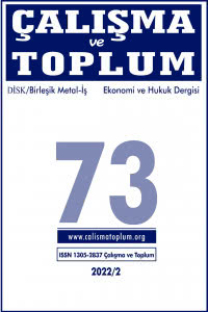Türkiye'de Resmi Sendikalaşma İstatistiklerinin Sorunları Üstüne
There is a serious confusion on the union density and trade union membership statistics in Turkey. The information available on the membership of workers’ and public employees’ organizations is fragmentary and generally contradictory. There are very different data relating to union density, union membership and total employees which have the right to organise according to internationally recognized ILO conventions. Turkish union density figures are not comparable across countries and they have not been acknowledged by ILO. The lack of similar international statistical guidelines on trade union membership leads to serious problems. This paper examines the official trade union membership statistics in Turkey and discusses whether they are reliable or not in the light of international comparisons. Focusing on Trade Union Act 2821 , Collective Bargaining, Strike and Lockout Act 2822 and Public Employees’ Trade Union Act 4688 and taking into account the ILO criteria and norms, the paper explores the main problem areas derives from several shortages in these acts. Finally an alternative calculation method of trade union density and data collection method is submitted.
Keywords:
Trade Union Statistics, Trade Union Membership Trade Union Density, ,
___
- ATEŞOĞULLARI, K.(1997), Uluslararası Çalışma Örgütü ve Türkiye, Petrol-İş Yayın no 44, İstanbul
- BAYER, İ. (1998), Sendikalaşma Oranları, Sendikacılık Ansiklopedisi, Cilt 3. İstanbul. Tarih Vakfı-Kültür Bakanlığı Ortak Yayını.
- BOERI, T., BRUGIAVINI, A. And CALMFORS, L. (Ed.). (2001), The Role of Unions in the Twenty-First Century, Oxford.
- ÇALIŞMA ve SOSYAL GÜVENLİK BAKANLIĞI, Çalışma Hayatı İstatistikleri, Ankara. Çeşitli Yıllar
- DİE. Hane Halkı İş Gücü Veri Tabanı, www.die.gov.tr
- DİE. Araştırma ve Soru Envanteri, www.die.gov.tr
- DİE, 2003 Hanehalkı Bütçe Anketi Sonuçları
- EHRENBERG, R.G. and SMITH, R, S.(2002) Modern Labor Economics, Boston: Addison Wesley.
- EUROFOUND. (2002), Industrial Relations in the EU, Japan and USA, European Foundation for the Improvement of Living and Working Conditions, www.eiro.eurofound.eu.int/print/2002/12/feature.tn0212101f.html
- EUROFOUND. (2004), Trade Union membership 1993-2003, European Foundation for the Improvement of Living and Working Conditions, www.eiro.eurofound.eu.int/print/2004/03/update/tn0403105u.html
- HÜRRİYET GAZETESİ (26 Ekim 1998). “Sendikalaşmada OECD Sonuncusu Olduk”.
- ILO (1997). World Labour Report 1997-1998. Geneva, 1997.
- ILO. (1994). Freedom of Association and Collective Bargaining, Geneva.
- ILO. (2002). Report of the Committee of Experts on the Application of Conventions and Recommendations. International Labour Conference 90th Session, Geneva
- ILO. (2003). General Report, Seventeenth International Conference of Labour Statisticians. Geneva, 24 November-3 December 2003.
- ILO. (2004). Organizing for Social Justice, International Labour Conference 92th Session, Geneva.
- KORAY, M. (2000), Sosyal Politika. Bursa. Ezgi Kitabevi
- KRİSTAL-İŞ SENDİKASI. (1999) 13. Olağan Genel Kurul Çalışma Raporu. İstanbul.
- PARASIZ, İ. (2002), Modern Emek Ekonomisi. Bursa. Ezgi Kitabevi.
- PETROL-İŞ SENDİKASI. (1995), Yıllık 95-96. (Hazırlayan: İlyas Köstekli), İstanbul.
- TİSK. Çalışma ve İşgücü İstatistikleri. 1980-2001. Çeşitli Yıllar
- TİSK.(2000) Avrupa Birliği’ne Üyelik Sürecinde AB Ülkeleri ve Diğer Aday Ülkeler Karşısında Türkiye’nin Durumu. Ankara.
- TOKOL, A. (2000), Sosyal Politika. Bursa.
- WADDINGTON, J. (2005), Trade Union Membership in Europe, ETUI-REHS, http://www.etui-rehs.org/modernising_trade_unions/books
- WORLD BANK. (2000), Unions and Collective Bargaining. Washington, D.C.
- Yargıtay 9. Hukuk Dairesi, Esas No: 2002/899, Karar No: 2003/46
- YASALAR: 2821 Sayılı Yasa, 2822 Sayılı Yasa, 4688 Sayılı Yasa, 5198 Sayılı Yasa, 4101 Sayılı Yasa
- ISSN: 1305-2837
- Yayın Aralığı: 4
- Başlangıç: 2003
- Yayıncı: DİSK Birleşik Metal-İş
